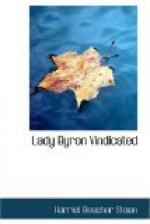’It has sometimes occurred to me, that the occult causes of his lady’s separation from him, round which herself and her legal advisers have thrown such formidable mystery, may have been nothing more than some imposture of this kind, some dimly-hinted confession of undefined horror, which, though intended by the relater to mystify and surprise, the hearer so little understood as to take in sober seriousness.’ {225}
All we have to say is, that Lord Byron’s conduct in this respect is exactly what might have been expected if he had a crime on his conscience.
The energy of remorse and despair expressed in ‘Manfred’ were so appalling and so vividly personal, that the belief was universal on the Continent that the experience was wrought out of some actual crime. Goethe expressed this idea, and had heard a murder imputed to Byron as the cause.
The allusion to the crime and consequences of incest is so plain in ‘Manfred,’ that it is astonishing that any one can pretend, as Galt does, that it had any other application.
The hero speaks of the love between himself and the imaginary being whose spirit haunts him as having been the deadliest sin, and one that has, perhaps, caused her eternal destruction.
’What is she now? A
sufferer for my sins;
A thing I dare not think upon.’
He speaks of her blood as haunting him, and as being
’My blood,—the
pure, warm stream
That ran in the veins of my fathers,
and in ours
When we were in our youth, and had
one heart,
And loved each other as we should
not love.’
This work was conceived in the commotion of mind immediately following his separation. The scenery of it was sketched in a journal sent to his sister at the time.
In letter 377, defending the originality of the conception, and showing that it did not arise from reading ‘Faust,’ he says,—
’It was the Steinbach and
the Jungfrau, and something else, more than
Faustus, that made me write “Manfred."’
In letter 288, speaking of the various accounts given by critics of the origin of the story, he says,—
’The conjecturer is out, and
knows nothing of the matter. I had a
better origin than he could devise
or divine for the soul of him.’
In letter 299, he says:—
’As to the germs of “Manfred,” they may be found in the journal I sent to Mrs. Leigh, part of which you saw.’
It may be said, plausibly, that Lord Byron, if conscious of this crime, would not have expressed it in his poetry. But his nature was such that he could not help it. Whatever he wrote that had any real power was generally wrought out of self; and, when in a tumult of emotion, he could not help giving glimpses of the cause. It appears that he did know that he had been accused of incest, and that Shelley thought that accusation the only really important one; and yet, sensitive as he was to blame and reprobation, he ran upon this very subject most likely to re-awaken scandal.




